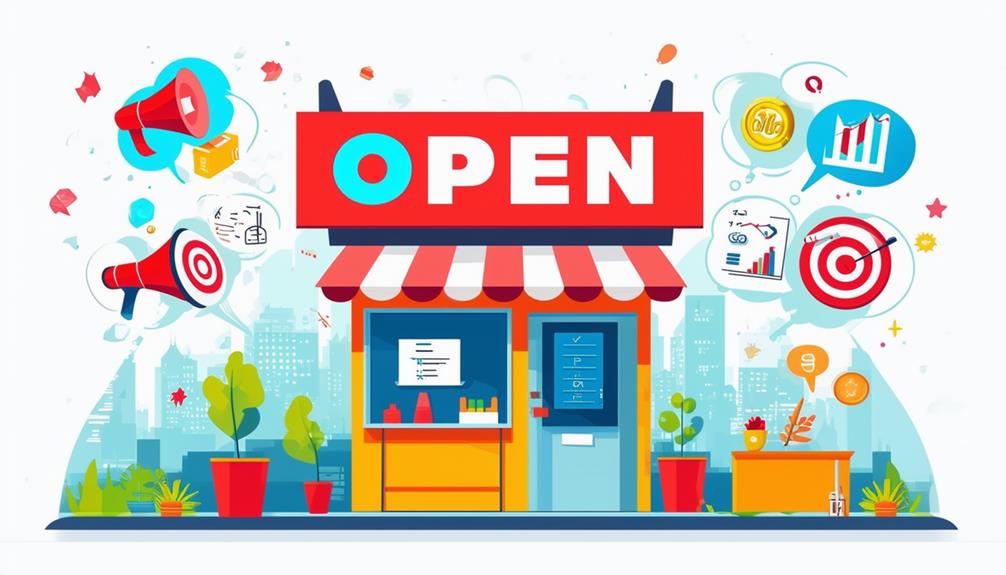
You recognize that effective marketing is no longer a nicety, but a necessity for your small business to thrive in today's competitive landscape. By establishing a unique value proposition, building brand awareness locally, and driving sales and revenue growth, you'll stand out and attract customers. Effective marketing helps you foster customer relationships online, stay relevant in a changing market, and maximize advertising budgets effectively. By measuring success with data analytics, you'll gain valuable insights to tailor your marketing efforts for maximum impact. As you move forward, you'll uncover even more strategies to propel your small business to new heights.
Establishing a Competitive Edge
By developing a unique value proposition that resonates with your target audience, you can differentiate your small business from larger corporations and establish a competitive edge in a crowded market. This is important because it allows you to stand out from the competition and attract customers who appreciate your unique offerings.
By differentiating your offerings, you can create a niche for yourself in the market, making it easier to attract and retain ideal customers.
To further enhance your competitive edge, focus on enhancing your visibility in the market. This can be achieved through targeted marketing strategies that showcase your unique value proposition. By doing so, you'll be able to reach a wider audience and increase your chances of attracting new customers.
Building Brand Awareness Locally
As you focus on building brand awareness locally, you'll find that targeted marketing efforts can help you establish a strong presence in your community, increasing visibility and recognition among local customers. By engaging in community-focused initiatives, you can create a sense of belonging among your target audience, fostering loyalty and advocacy.
Local partnerships, for instance, can help you tap into existing networks, amplifying your brand's reach and credibility. Additionally, participating in local events and sponsoring community activities can position your business as a caring and invested member of the community. By doing so, you'll not only increase brand awareness but also build trust and credibility among local customers.
This, in turn, can drive customer loyalty and retention, ultimately giving you a competitive edge over larger competitors. By prioritizing community engagement and local partnerships, you'll be well on your way to establishing a strong brand presence that resonates with your target audience.
Driving Sales and Revenue Growth
You can now take your brand's local presence to the next level by focusing on driving sales and revenue growth through targeted marketing strategies that attract new customers and encourage repeat business. By prioritizing marketing, you can expect an average revenue increase of 20% compared to those that don't.
Effective marketing efforts directly impact revenue generation, with a potential return on investment of up to 5x. To maximize sales growth, focus on enhancing customer experience through personalized interactions and tailored offerings. This will lead to increased customer loyalty and retention, resulting in repeat business and positive word-of-mouth.
Investing in digital marketing techniques can result in a 24% increase in revenue growth. By implementing lead generation and customer retention campaigns, you can greatly boost sales and overall revenue. Additionally, increasing market share becomes more achievable as you expand your customer base and establish your brand as a leader in the market.
Fostering Customer Relationships Online
In today's digital age, fostering customer relationships online is essential for small businesses. It allows for personalized interactions, timely feedback, and targeted marketing efforts that drive loyalty and retention.
As a small business owner, you can leverage social media to engage directly with customers, build a community around your brand, and encourage online feedback. This valuable feedback can help you improve your products and services, enhancing customer relationships.
Here are three ways to foster customer relationships online:
- Personalized email campaigns: Deliver relevant content and offers to nurture customer relationships.
- Utilize chatbots: Provide real-time customer support and strengthen relationships through instant communication.
- Implement CRM software: Track interactions and preferences to facilitate personalized communication and relationship-building.
Staying Relevant in a Changing Market
To stay ahead of the curve, small business owners must continually adapt their marketing strategies to respond to shifting consumer preferences and market trends, ensuring their business remains relevant and competitive in an ever-changing landscape.
You need to be proactive in adapting strategies to meet evolving demands, introducing new products or services that cater to changing tastes and preferences. Effective marketing enables you to position yourself as a trendsetter in your industry, staying ahead of the competition and attracting loyal customers.
By continuously evolving and growing in response to market dynamics, you can maintain a strong market positioning and stay relevant in a rapidly changing market. This adaptability allows you to stay competitive, innovative, and attractive to your target audience.
Maximizing Advertising Budgets Effectively
By leveraging data-driven insights, small businesses can strategically allocate their advertising budget to maximize ROI and drive sustainable growth. You can optimize your advertising spend by tracking performance and making data-driven decisions. This approach guarantees that every dollar spent contributes to achieving your business goals.
To maximize your advertising budget effectively, focus on the following key areas:
- Track and analyze performance metrics:
Monitor your advertising campaigns' performance to identify which channels and strategies are most effective.
- Optimize spend based on data insights:
Adjust your marketing strategies based on performance metrics to maximize your ROI.
- Continuously monitor and adjust:
Regularly review your advertising performance and make adjustments to maintain your budget is allocated efficiently.
Measuring Success With Data Analytics
You can leverage data analytics to measure the success of your advertising efforts and make data-driven decisions that drive business growth. By tracking key performance indicators (KPIs) such as website traffic, conversion rates, and customer engagement, you can gain valuable insights into the effectiveness of your marketing campaigns. This data-driven approach allows you to identify areas of improvement, optimize your strategies, and allocate your budget efficiently.
Data analytics provides a deeper understanding of your customers' behavior, preferences, and trends, enabling you to tailor your marketing efforts for maximum impact. By continuously monitoring and adjusting your marketing strategies, you can improve decision making and enhance performance monitoring. This leads to better ROI on your marketing investments and drives business growth.
With data analytics, you can make informed decisions, reduce waste, and maximize your advertising budget. By leveraging data analytics, you can take your marketing efforts to the next level and achieve sustainable success.
Frequently Asked Questions
Why Is Marketing Important in a Small Business?
As you navigate the competitive landscape, you realize that marketing is essential to boost brand awareness, fostering customer engagement that drives loyalty, and ultimately, fuels your small business's growth and sustainability.
What Is the Function of Marketing in Small Scale Business?
As you navigate your small business, marketing's primary function is to build brand awareness, driving customer retention through strategic campaigns that foster loyalty, trust, and recognition, ultimately propelling your venture forward.
What Is Marketing and Why Is It Important?
'As you navigate the market, you'll realize marketing is essential for building your brand identity, uncovering valuable customer insights, and ultimately driving business growth – it's the key to standing out and winning loyal customers.'
Why Is Marketing Mix Important for a Small Business?
By mastering the marketing mix, you'll establish brand consistency, gain a competitive advantage, and create a unique identity that sets you apart from rivals, ultimately driving business growth and customer loyalty.
Conclusion
As you wrap up your marketing strategy, remember that it's an ongoing process. Stay agile, adapt to changes, and continually measure performance.
By prioritizing marketing, you'll not only gain a competitive edge but also build a loyal customer base, drive revenue growth, and stay ahead in a rapidly changing market.
By leveraging data analytics, you'll make informed decisions to maximize your advertising budget.
Now, it's time to put your strategy into action and watch your small business thrive.
- How to Track and Improve Website Conversion Rates - 14/01/2026
- Best Practices for Call-to-Action Buttons - 09/01/2026
- The Psychology of Colours in Web Design - 04/01/2026


